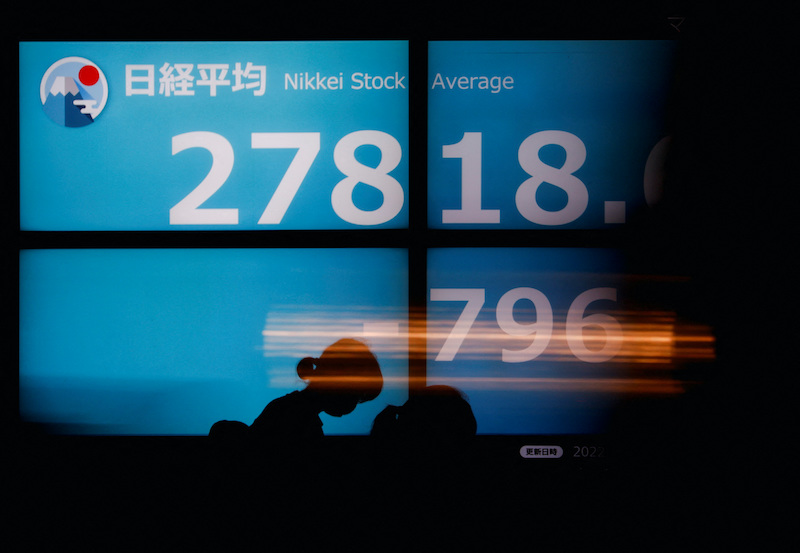Asia’s major stock markets were in subdued mood on Friday with underwhelming economic data out of the US and China dampening the mood.
Uncertainty over the debt ceiling stand-off in the US added to the downbeat atmosphere along with persistent worries over its banking sector.
Bucking the trend was Japan’s Nikkei which closed at an 18-month high, led by gains in chip-related heavyweights, as investors cheered announcements of domestic firms’ shareholder returns at the peak of the earnings season.
The Nikkei share average ended 0.90% higher at 29,388.30, its highest close since November 2021. For the week, the index added 0.79%. The broader Topix advanced 0.64% to 2,096,39 and posted a 1% weekly gain.
Also on AF: G7 Nations Planning Ways to Counter China ‘Coercion’: Yellen
However, SoftBank Group Corp fell 3.68% and weighed on the Nikkei the most after the Japanese technology investor posted an annual loss that was more than three times as big as market expectations.
And Sharp Corp tanked 8.69% after the electronics maker reported a surprise $1.9 billion loss on writedowns of its panel display business and other assets.
China stocks fell for a fourth straight session, as a range of weak economic data darkened the world’s second-biggest economy’s recovery prospects. Hong Kong shares also dipped.
New Chinese bank loans tumbled far more sharply than expected in April, data showed on Thursday, adding to worries that the economy’s post-pandemic recovery is losing steam.
The weak readings came hours after data showed deflationary pressures were deepening in China, and days after news that imports had contracted sharply.
The Shanghai Composite Index dropped 1.12%, or 37.19 points, to 3,272.36, while the Shenzhen Composite Index on China’s second exchange retreated 1.12%, or 22.73 points, to 2,010.04.
Hong Kong’s tech stocks rose 1.2%, helped by a 7% jump in e-commerce giant JD.com after earnings beat. The Hang Seng Index, though, fell 0.59%, or 116.55 points, to 19,627.24.
Elsewhere across the region, in early trade, there were gains in Mumbai and Wellington but Shanghai, Sydney, Seoul, Singapore and Taipei were in negative territory.
MSCI’s broadest index of Asia-Pacific shares outside Japan fell 0.6% and was headed for a weekly decline of 1.2%.
US Banking Fears Return
The mood looked set to brighten a little as European markets opened. Pan-region Euro Stoxx 50 futures climbed 0.3%, Nasdaq futures rose 0.3% and S&P 500 futures were 0.2% higher.
Overnight, data showed US jobless claims jumped to an 18-month peak last week, while producer prices rose at their smallest annual increase in more than two years, hinting at a potentially more abrupt slowing in the world’s largest economy.
The data, however, added confidence that Federal Reserve is almost certain to pause its rate hikes at its policy meeting in June, with futures markets continuing to price in cuts of about 78 basis points by the end of the year.
Banking fears reverberated overnight. PacWest again led declines in US regional banks with a sharp fall of 23% overnight, after it reported its deposits fell 9.5% last week.
Shares of US big banks were also lower after the US Federal Deposit Insurance Corporation (FDIC) said big lenders would bear the cost of replenishing its deposit insurance fund caused by recent bank failures.
That pulled the Dow lower, although the Nasdaq added 0.2%, supported by a 4.3% jump in Alphabet Inc on its rollout of more artificial intelligence products.
Biden Debt Ceiling Talks
Uncertainty around raising the US debt ceiling persisted. A meeting between US President Joe Biden and top lawmakers that had been scheduled for Friday has been postponed to early next week, with the IMF warning that a default would have “serious repercussions” for the US economy.
The US dollar benefited from safe-haven flows amid growth concerns and banking worries, holding onto its 0.6% gain overnight at 102.02 against a basket of currencies.
Treasury yields were slightly lower in Asia, after longer-dated yields declined further overnight on soft data. Benchmark 10-year notes were 2 basis points lower at 3.375%, while two-year yields were also 2 bps lower at 3.883%.
The Bank of England stuck to the script by raising its key interest rate by a quarter of a percentage point to 4.5% on Thursday. It, however, vowed that it would “stay the course” to curb the highest inflation of any major economy.
Oil is set to fall for a fourth straight week. US crude futures edged 0.4% lower to $70.56 per barrel, while Brent crude eased 0.5% to $74.59 per barrel. Gold prices were 0.2% lower at $2,011.41 per ounce.
Key figures
Tokyo – Nikkei 225 > UP 0.90% at 29,388.30 (close)
Hong Kong – Hang Seng Index < DOWN 0.59% at 19,627.24 (close)
Shanghai – Composite < DOWN 1.12% at 3,272.36 (close)
London – FTSE 100 > UP 0.43% at 7,763.74 (0935 GMT)
New York – Dow < DOWN 0.66% at 33,309.51 (Thursday close)
- Reuters with additional editing by Sean O’Meara
Read more:
China Bank Loans Plunge Far More Than Expected in April
China Inflation Slows, Producer Prices Drop as Demand Slips























